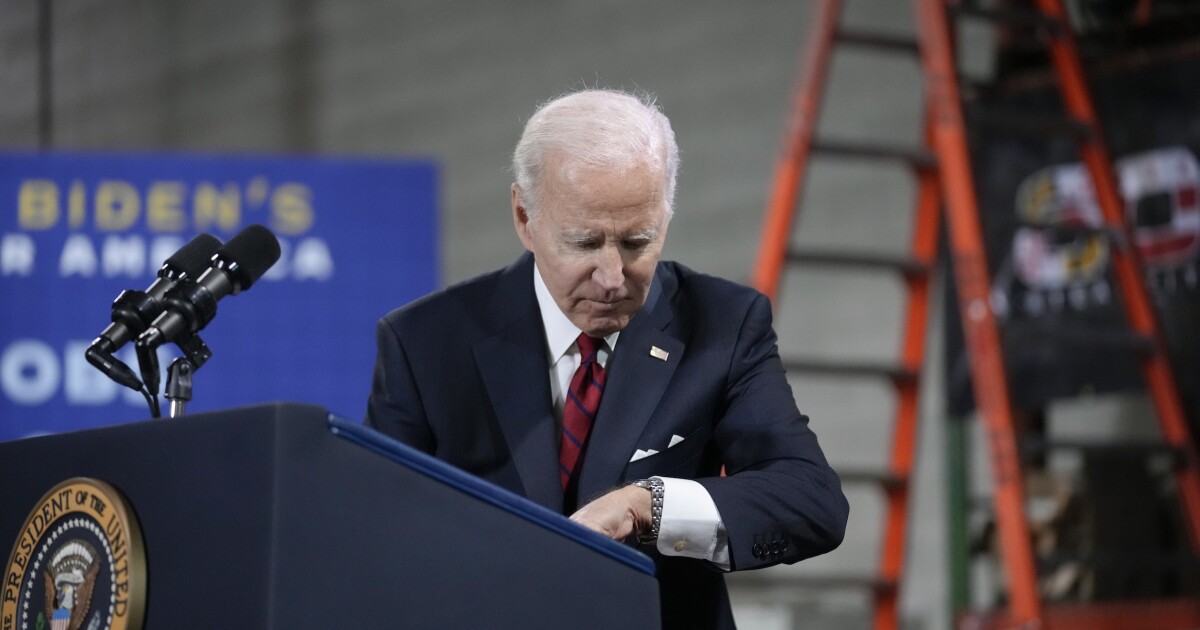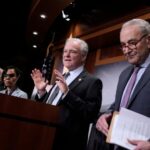

President Joe Biden has less than a week to decide whether to sign or try to stop a bill declassifying COVID-19 origins intelligence that passed with veto-proof majorities.
Both chambers of Congress unanimously passed legislation that would force the Biden administration to declassify all the information it has gathered on how the virus started as federal agencies are split between whether it began in nature or a lab leak.
BIDEN ADMINISTRATION ACCUSED OF CREATING ‘GAG POLICY’ FOR SCIENTIFIC RESEARCH
“Transparency is a cornerstone of our democracy,” Rep. Jim Himes (D-CT), the intelligence committee’s top Democrat, said during debate. “Because without transparency, the American people can’t make the sounds that they need to make responsibly as citizens of a democracy.”
The House passed the COVID Origins Act by a 419-0 vote and the Senate by unanimous consent, yet the White House has been noncommittal.
“We will continue to use every tool to figure out what happened here while also protecting classified information,” press secretary Karine Jean-Pierre said. “We’re going to take a look at the bill. I just don’t have anything to share on how we’re going to move forward at this time.”
Biden said he hadn’t “made that decision yet” when asked whether he’d sign the bill. The White House could have declassified the information on its own and has thus far chosen not to.
The House vote came last Friday, March 10, and presidents have 10 days, excluding Sundays, to sign or veto. That would land Biden’s deadline on Wednesday, March 22.
Should the president veto, a two-thirds majority in both chambers would be needed to override, which could come at any point during the 118th Congress.
Only 106 out of 1,484 presidential vetoes from 1789 through 2004 were overridden, according to the Congressional Research Service. However, with a unanimous vote, Biden would likely not be able to sustain a veto.
Dr. Steven Quay hopes the information does come to light.
“I’m cautiously optimistic,” said Quay, who favors the lab leak theory. “I’d like to see records from the fall of 2019 and more communications. The concept that the virus came from a market requires that it started in December. Any evidence that it’s anywhere else in the fall before that is evidence against it beginning in a market in December.”
If signed into law, the bill would require within 90 days the declassification of “any and all information relating to potential links between the Wuhan Institute of Virology and the origin of the Coronavirus Disease,” including whether any researchers grew ill.
The legislation’s passage marks a striking departure from the early days of the pandemic when the lab leak hypothesis was dismissed as a conspiracy theory. Since then, the nation’s 18 intelligence agencies have said both theories are plausible, yet the debate continues to divide the intelligence and scientific communities.
Although the bill garnered overwhelming support on the House floor, Democrats and Republicans engaged in a drawn-out debate before casting their votes. Several Republicans in their speeches sought to blame not only the Chinese government but also some U.S. officials, namely Dr. Anthony Fauci.
“Big government bureaucrats like Anthony Fauci abused their positions of power to disguise and distort the facts and a further tyrannical approach to our country,” Rep. August Pfluger (R-TX) said of the former director of the National Institute of Allergy and Infectious Diseases. “Fauci knew as early as March of 2020 that coronavirus leaked from a lab in Wuhan, China.”
Some Democrats, on the other hand, urged caution.
“We shouldn’t be so certain … that we’re willing to impugn the character and motives of other Americans, especially if those Americans are in positions of responsibility that need to be trusted in the next pandemic,” said Himes. “We just don’t know. And we’re entitled to speculate, we’re entitled to have a theory, but I would just urge caution about impugning people’s motives, impugning their character, based on those theories.”
There is a real chance Biden could veto the bill, argues Cato Institute senior fellow Patrick Eddington, at which point the question would be whether GOP leadership can convince enough Democrats to override.
One concern Biden may have is that human sources could be compromised, for example, if a source within the Chinese government is named in the intelligence. However, any information released is subject to redaction.
CLICK HERE TO READ MORE FROM THE WASHINGTON EXAMINER
The smart play, Eddington argues, is to let the bill pass.
“Biden would be wise to just sign the bill and direct [Director of National Intelligence Avril] Haines to comply,” he said. “Asking for Democrats in House swing districts to fall on their sword over this issue would be bad political strategy, to say the least.”







